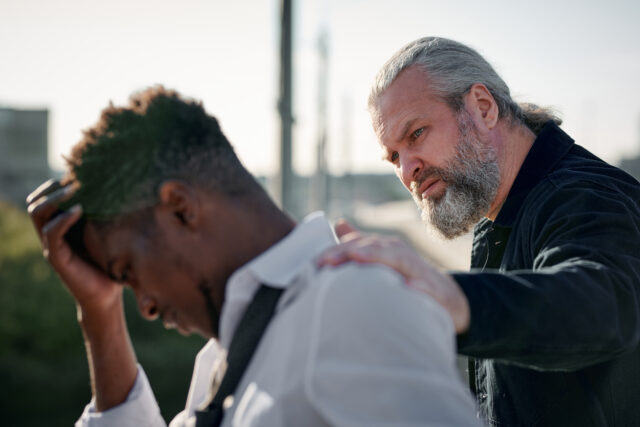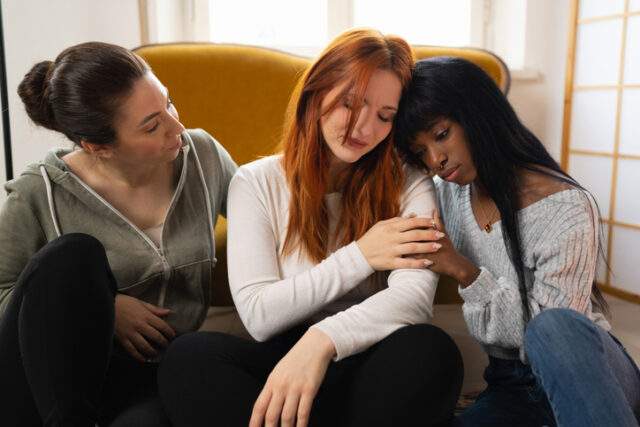Generosity is a wonderful quality to have, but as always, it’s possible to have too much of a good thing.

‘Human Giver Syndrome’ is when you feel like your entire worth is tied to what you give people, leaving little room for your own needs. You’re constantly caring for everyone else, but you rarely look after yourself. If this sounds familiar, here are 13 signs you might be suffering from it and ways you can start to heal.
1. You constantly put everyone else’s needs ahead of your own.

You’re always there for other people, but when it comes to your own needs, they take a back seat. If you’re constantly putting yourself last, it’s a sign you might be stuck in the ‘giver’ role. Healing starts by recognising your needs are just as important.
2. You feel guilty when you say no.

Every time you try to say no, guilt creeps in, and you end up agreeing to things you don’t have the time or energy for. Learning to say no without guilt is a big part of healing from this syndrome. It’s okay to set boundaries.
3. You’re exhausted but keep pushing through.

You feel drained all the time but still push yourself to meet everyone else’s expectations. Exhaustion is a major sign that you’re giving too much without recharging. Taking time for rest and self-care is crucial for healing.
4. You struggle to ask for help, even when you need it.

You’re the one people rely on, but when you need support, you hesitate to ask. You feel like you should be able to handle everything on your own. Healing involves letting go of that pressure and allowing yourself to lean on other people sometimes.
5. You feel unworthy unless you’re being “useful.”

Your sense of worth is tied to how much you can give or do for other people. If you’re not constantly helping or fixing things, you feel like you don’t matter. Realising that your worth isn’t tied to how much you give is key to healing.
6. You have trouble accepting compliments or praise.

When someone compliments you, it feels uncomfortable or undeserved. This is a sign you’ve internalised the idea that you’re only valuable when you’re giving, not receiving. Learning to accept kindness from other people can help shift this mindset.
7. You feel resentful, but then guilty for feeling that way.

You’re tired of giving so much, but then you feel bad for even thinking that way. This cycle of resentment followed by guilt is common with ‘Human Giver Syndrome.’ Acknowledging your resentment is the first step toward setting healthier boundaries.
8. You rarely take time just for yourself.
 Source: Unsplash
Source: Unsplash When was the last time you did something purely for your own enjoyment, without thinking of other people? If you can’t remember, it’s a sign you need more balance in your life. Taking time for yourself is not selfish—it’s necessary.
9. You feel anxious when things aren’t “perfect.”

Whether it’s work, family, or relationships, you feel responsible for making sure everything runs smoothly. The pressure to maintain perfection adds to your stress. Healing means letting go of the need to control everything and accepting that imperfection is okay.
10. You’re afraid people will stop liking you if you stop giving.

You worry that if you stop being the one who gives and helps, people won’t value you anymore. This fear keeps you stuck in the giver role. Learning that you’re worthy of love and respect without constantly giving is an important step in healing.
11. You never feel like you’re doing enough.

No matter how much you do for other people, it never feels like enough. You keep raising the bar for yourself, even though it’s already high. Healing involves recognising that you don’t have to be perfect or do everything to be worthy of care.
12. You’ve lost touch with what you really want.

You’ve spent so much time focusing on what other people need that you’re not even sure what makes *you* happy anymore. Rediscovering your own interests and passions is a huge part of healing from ‘Human Giver Syndrome.’
13. You feel burnt out but can’t seem to stop.

The burnout is real, but you still feel like you have to keep going for everyone else. Stopping feels impossible, even though you know you need a break. The first step to healing is acknowledging that burnout is a sign that you need to prioritise your own well-being before anything else.
14. How to heal.

Setting boundaries is key—start by saying no to things that drain your energy. Make self-care a daily priority, even if it’s something small just for you. Learn to accept help and kindness from others without guilt, and focus on your own needs, making sure they’re at the top of your list. Finally, let go of the guilt; taking care of yourself isn’t selfish, it’s a must.




